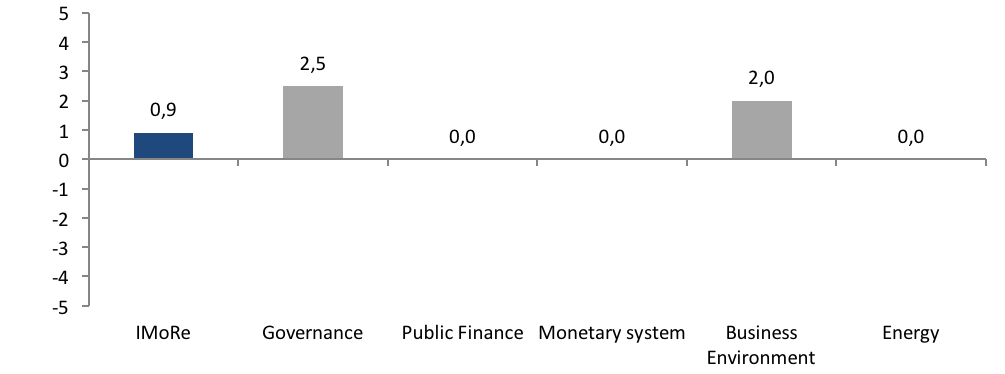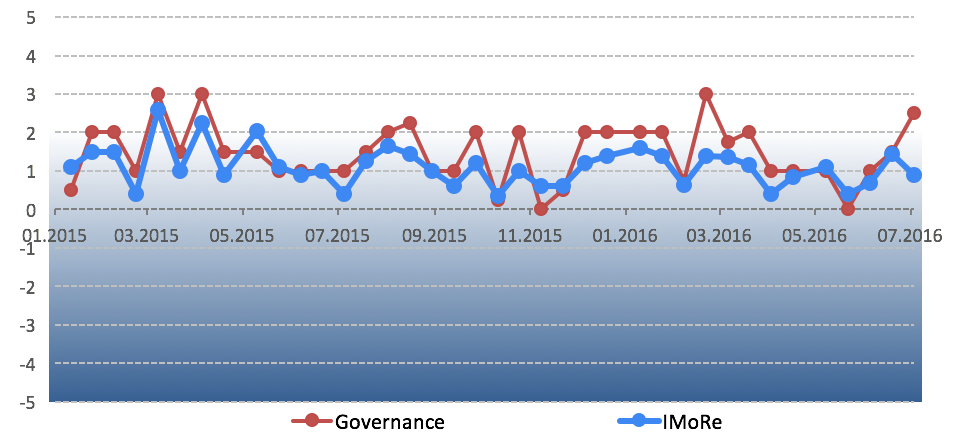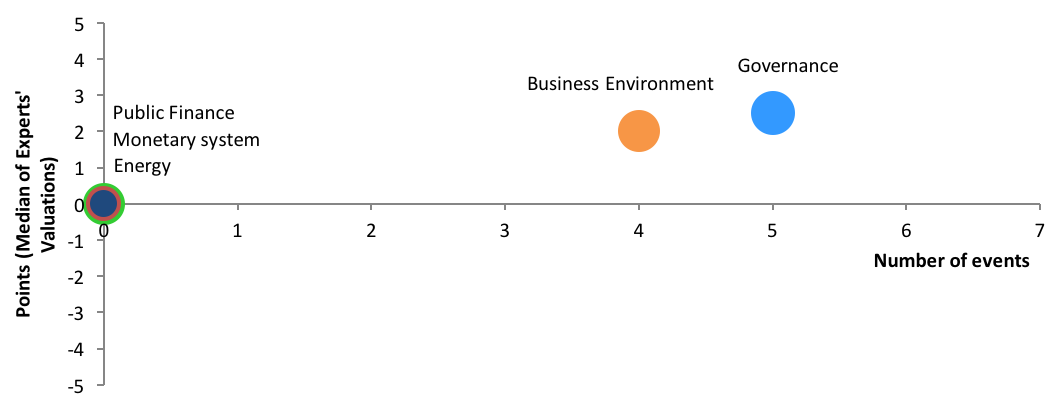Reform Index issue at the end of June included such crucial laws as constitutional amendments on the justice system and reform of the corporate governance of state enterprises.
The small value of Reform Index (+0.9 point out of possible +5.0) for the current reporting period, late June – early July, can be explained by the lack of reforms in public finance, monetary policy, and energy. Nonetheless, we note the tectonic shift in judicial reform and authorities’ efforts to promote effective management of state-owned companies and improve the business environment. These developments were highly appreciated by experts.
Chart 1. Reform Index dynamics.
Reform Index team considers index value of at least 2 an acceptable pace of reform
Chart 2. Reform Index and its components in the current round**

The most important positive developments
1) Amendments to the Constitution of Ukraine on justice: +5.5 points
The law 1401-VIII of 02.06.2016 is part of the judicial reform. The judicial system—and in particular the protection of property rights—has been considered as one of the major problems in Ukraine, a significant obstacle to investment and economic growth.
Constitutional changes are intended to strengthen the independence of the judiciary and ensure its impartiality and efficiency, reducing the risk of corruption. In particular, the amendments establish a “High Council of Justice” and give it a powerful mandate. The High Council of Justice proposes a candidate for a judicial post, appointments to which are made by the President. Only High Council of Justice has a right to dismisses or suspend judges, or to transfer them to another court. The law revokes the 5-year probationary period; now judges are appointed permanently. In addition, the Constitution now enshrines the competitive selection of judges.
A judge can now be arrested during or immediately after committing of a grave or especially grave crime. In other cases, a judge can be arrested with the consent of the High Council of Justice.
Ukraine’s Constitutional Court underwent some changes as well. Everyone will have a right to appeal to the constitutional court if he/she believes that the law used in the final judgment in his/her case contradicts the Constitution of Ukraine, if other means of legal defense were exhausted. The Parliament, the President, and the Congress of Judges no longer have the right to dismiss a judge of the Constitutional Court. Now they can be dismissed by at least two-thirds of Constitutional Court members.
The document establishes the possibility to accept the jurisdiction of the International Criminal Court starting in 2019, in addition to abolishing the broad general supervisory authority of prosecutors over law enforcement. The law also requires that only attorneys be allowed to represent clients in court. Exceptions to this rule are, for example, labor disputes, disputes concerning the protection of social rights, on elections and referendums, minor disputes and some others.
Most of the innovations of this law received positive evaluation. However, some provisions of the law were perceived negatively — in particular, the possible limitation of judges’ independence and restriction of the bar to attorneys (with exceptions mentioned above).
Amendments to the Constitution regarding the justice system open opportunities for fundamental reforms. Three key issues were resolved by the amendments: depoliticization and guarantee of the independence of the judiciary, increasing the responsibility of judges, and the revitalization of the body of judges based on professional competence, integrity, and professional ethics. In addition, prosecutorial functions were brought in line with European standards and the bar was solidified at the constitutional level, which aims to increase the protection of a citizen’s right to professional legal assistance. Citizens are also entitled to a constitutional complaint, giving additional opportunities to protect their constitutionally guaranteed rights and freedoms.
Oleksiy Filatov, Coordinator of the Judicial Reform Council, Secretary of the Constitutional Commission
I think the main achievements of the constitutional amendments are de-politicization and new guarantees of independence of the judicial system, together with introduction of flexible ways for its improvement. These are anti-corruption safeguards that are applied not only to the judge, but to a wide range of people close to him/her, opportunities for more modern and comprehensive system to evaluate judges, and finally open competitive processes that are expected for the majority of courts along with their reorganization. This is probably the reason why these law amendments received an incredibly positive assessment of international experts, the Venice Commission in the first place.
Andriy Kozlov, Democracy Reporting International
2) The corporate governance reform of state-owned enterprises: +4.3 points
Despite the fact that some state-owned enterprises are profitable, the sector as a whole has always been operating at a net loss. In addition, the sector of public enterprises is one of the main sources of corruption. Along with privatization, improvement of corporate governance is the main focus of public sector reform.
Legislative changes regarding the management of state- and city-owned property (1405-VIII of 02.06.2016) allow for the creation of supervisory boards on state and municipal unitary enterprises before corporatization, which still remains to be done. Supervisory boards will take over the ministries’ functions of strategic management, approval of financial plans, appointment and dismissal of managers and others. The majority of such supervisory boards should be independent members who are not civil servants or representatives of management.
Other innovations in the law include the requirement for an independent audit of the annual financial statements of state companies, in addition to increased disclosure requirements. In particular, state-owned enterprises are required to publish annual financial and audit statements, information about their management and supervisory board membership, information on their remuneration, etc.
With the law № 3062, state-owned enterprises have become more transparent and accountable. Public reporting and auditing reduce corruption risks, and the independent supervisory boards significantly narrow the ground for political influence. Corporate governance reform has a chance to significantly improve the efficiency of the public sector.
Yuliia Kovaliv, Ministry of Economic Development and Trade of Ukraine
A positive step towards improving the quality of public enterprise management. The main thing now is how the law will be applied. Namely, how the safeguards incorporated into the law will ensure the independence and impartiality of supervisory boards. It is also important that the law be consistent with the requirements of the “IMF package” and thus be a step on the way to the next tranche.
Veronika Movchan, Institute of Economic Research and Policy Consulting
3) Abolition of the mandatory state registration of foreign investments: +2,0 points
The Verkhovna Rada has simplified the procedure for foreign investment by abolishing their compulsory registration (Law 1390-VIII of 31.05.2016). Previously only pre-registered foreign investments qualified for privileges and guarantees from the state, which included the freezing of relevant legislation for 10 years from the date of investment registration in case of legislation change, the right to withdraw investment without paying duties within 6 months from the date of termination of activities, etc. Compulsory registration was just another regulation, which did not provide any new data on foreign investments, their sizes and investment structures being publicly available.
Symbolic changes. The abolished rules are vestigial remnants of the state protection of investments. Since the State was unable to help to protect investments either politically or concretely, the state registration of investments had no practical meaning — either in terms of popularity among investors (acting corporate law and treaties on mutual protection of investments give all possible guaranties) or in terms of benefits for the state (due to registration the state could not provide any additional guarantees above the aforementioned corporate law or investment protection agreements). Therefore, this provision is a classic example of the rules which should be abolished since they do not have any effect except for confusing investors.
Taras Kachka, International Renaissance Foundation
Chart 3. Value of Reform Index components and number of events June 20 – July 3, 2016
Reform Index aims to provide a comprehensive assessment of reform efforts by Ukraine’s authorities. The Index is based on expert assessments of changes in the regulatory environment in five areas:
- Governance and Anti-Corruption
- Public Finance and Labor Market
- Monetary Policy and Financial Markets
- Industrial Organization and Foreign Trade
- Energy Independence
For details please visit reforms.voxukraine.org
Attention
The authors do not work for, consult to, own shares in or receive funding from any company or organization that would benefit from this article, and have no relevant affiliations





